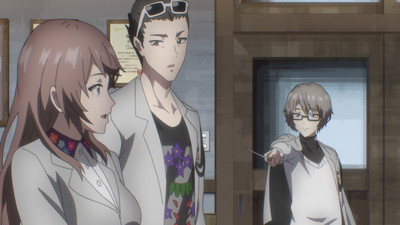Over the past season, Caligula has been teasing out bits and pieces of the various Go-Home Club members' backstories, though nothing concrete enough to allow its audience to make anything more than educated guesses about the kinds of people our heroes might be outside of Mobius. Seeing as we're nearing the conclusion of Caligula's run, I'd honestly given up hope on the series addressing its cast members' personal histories. Well, consider this yet another Monkey's Paw scenario, where Caligula gives me exactly what I wanted all along by revealing the tragic backstory of every main character except for Ritsu, but in the worst way I could have possibly imagined.
Episode 10 of Caligula is a bottle episode, with the entire Go-Home Club trapped in a single room for the whole runtime, meaning that the script has to rely completely on dialogue and flashbacks to maintain its momentum. Bottle episodes can work when done well; in the best cases, they provide a great opportunity for characters to bounce off each other in unexpected ways, and the restraint of the format can often result in a story being forced to flex its creative muscles in ways it might otherwise not. In the worst cases though, you have an episode like this, where characters literally just sit down in a circle and explain their personal motivations because the story couldn't be bothered to work in any of this information organically. The flimsy justification for getting this conversation started is that the group suspects that Kensuke might be leaking their plans to his former Musician friends, and Kensuke proposes that the group all share their personal secrets, so everyone can believe in everyone else. It's ridiculous, but more to the point it's so brazen in trying to excuse this premise's existence that I couldn't help but be a little impressed by it. It's as if the show's writers realized that they had forgotten to adequately develop any of the characters, so they madly scrambled to shove everything into one episode before the end of the season.
In truth, these personal histories were likely meant to feel like big reveals, letting the audience see who these pretty anime heroes really are underneath the surface. The problem is, the characters have been so poorly developed that nothing we learn here is the least bit surprising; somehow, digging into their backstories manages to make them even less interesting than they were before. Shogo is a 30-year old shut-in who blames himself for the death of his friend; Kotaro is a young boy who feels ashamed of his small stature, because he wants to be a rescue operator like his deceased father; Suzuna has no friends; Naruko is bullied at school; Mifue resented her obese mother so much that she developed an eating disorder of her own, and so on. There's admittedly a kernel of an interesting idea in having these characters all come from disparate backgrounds and age groups, but the episode doesn't do anything with it other than fit in a couple of jokes at the expense of Kotaro's real age. Otherwise, even after spilling their guts to one another for an entire episode, the majority of the Go-Home Club remains just as bland and forgettable as they always have been.
The only two characters with marginally compelling personal lives would be Kensuke and Minezawa. Kensuke's story is somewhat unique in that he doesn't suffer from any kind of overtly terrible life; he's simply an average person who wishes he was talented and skilled enough to be exceptional, and he only switched over to the Go Home Club when he realized that the he wasn't truly satisfied with the way that Mobius allowed him to cheat his way to becoming a successful musician. A better story might taken the time to develop Kensuke into someone with depth and personality, but this is Caligula, where we'll have to settle for someone who at least resembles a three-dimensional character if you squint.
Minezawa does have to live with an overbearing and possibly abusive mother, though his motivations are at least a bit more complex than everyone else's, which all essentially boil down to “I learned to appreciate my life through the power of friendship!”. Minezawa's desire hearkens back to his fight with Ike-P, where he revealed that he resents his eternally beautiful and unblemished face in Mobius. In the real world, Minezawa scarred his face as proof that he retained even a modicum of autonomy, and he wants nothing more than to go back to being able to see his true imperfect visage. Truth be told, I find it troubling how Caligula handwaves Minezawa's self-harming tendencies, but it's also the closest this show has ever come to making me care about one of its characters.
That the most emotion I can muster for anyone in Caligula's cast is “slightly troubled concern” is a bad sign for a show so close to it's conclusion. I wager that Caligula is itself aware of just how badly it's botched itself, because Marie arrives at the end of the episode to turn evil for no reason and toss a grenade at all her friends, leaving the show on yet another meaningless cliffhanger. To put things into perspective, this is a series that can somehow make “Sudden Betrayal By Way of Random Grenade” into a complete nothing moment, just another senseless plot point to be lost in a haze of lazy storytelling and limp characterization. This show has gone from bad to worse very quickly, so all that's left to do is count down the days until it's over.
Rating: D+
Caligula is currently streaming on Crunchyroll.




0 comments:
Post a Comment